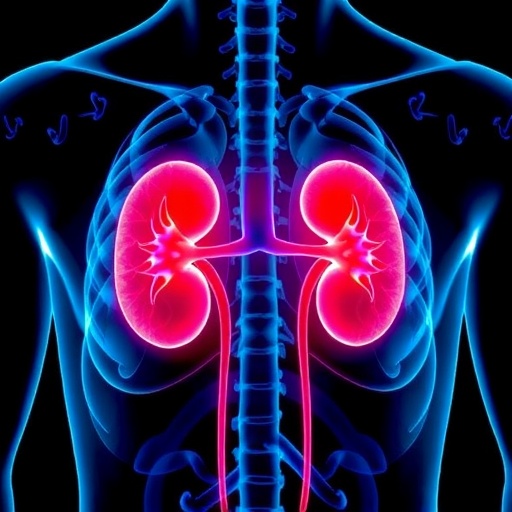Chronic kidney disease (CKD) has long been recognized as a formidable health challenge, affecting millions globally with its devastating impacts on renal function. However, recent groundbreaking research has illuminated a far more sinister consequence of this condition — an alarming association with sudden cardiac death (SCD). This revelation, emerging from a comprehensive study spearheaded by Li, Jiang, Ouyang, and colleagues, attests to the complex interplay between renal deterioration and cardiovascular mortality, marking a pivotal advancement in our understanding of CKD’s systemic repercussions.
The study presents an extensive epidemiological analysis that correlates CKD with significantly heightened instances of sudden cardiac death. Traditionally, CKD’s primary concern rested with progressive loss of kidney function leading to end-stage renal disease. However, this research unravels a crucial and nuanced relationship, spotlighting cardiac complications as a leading cause of mortality in this population. These findings force the medical community to pivot towards a more integrated approach in managing CKD, emphasizing vigilant cardiovascular risk assessment alongside renal care.
Delving into the mechanistic underpinnings, the study elucidates how CKD-induced metabolic disturbances contribute to cardiac electrical instability. The kidneys play an essential role in maintaining electrolyte balance, and their malfunction in CKD provokes electrolyte imbalances, such as hyperkalemia and hypocalcemia, which are known to precipitate fatal arrhythmias. Furthermore, CKD generates a pro-inflammatory milieu laden with oxidative stress, fostering myocardial fibrosis and autonomic dysfunction, both of which exacerbate vulnerability to sudden cardiac events.
One of the major revelations of this research lies in the identification of uremic toxins as critical mediators of cardiac risk. In CKD, the accumulation of protein-bound uremic toxins, such as indoxyl sulfate and p-cresyl sulfate, has been shown to promote endothelial damage and impair nitric oxide signaling. This cascade results in heightened vascular stiffness and compromised coronary microcirculation, conditions that predispose patients to ischemic cardiac injury and abrupt cardiac death.
Importantly, the study leverages a longitudinal cohort design, incorporating robust data from diverse populations, thus strengthening the generalizability of the findings. The researchers harnessed advanced statistical models to adjust for confounding factors including age, hypertension, diabetes, and smoking status. Even after stringent adjustments, CKD independently emerged as a powerful risk factor for SCD, underscoring its unique pathogenic influence.
In addition to epidemiological insights, the research team employed state-of-the-art cardiac imaging and electrophysiologic monitoring in a subset of patients. This approach provided direct evidence of disturbed cardiac conduction and erratic ventricular repolarization patterns in CKD patients, imaged through sophisticated modalities such as cardiac MRI and signal-averaged ECG. These phenotypic cardiac alterations form the substrate for lethal ventricular arrhythmias, sharping a clinical phenotype that demands targeted vigilance.
The impact of this discovery resonates deeply in clinical practice. Current management guidelines for CKD primarily focus on controlling hypertension, proteinuria, and slowing renal function decline, with limited emphasis on cardiovascular mortality prevention specific to arrhythmogenesis. This paradigm-shifting study suggests that cardioprotective strategies, including closer ECG surveillance, optimization of electrolytes, and potential use of anti-arrhythmic therapies, should be integrated into standardized CKD patient care protocols as a means to thwart SCD.
Moreover, the findings breathe new life into the translational pipeline aimed at novel therapeutic development. Pharmaceutical interventions targeting uremic toxins and inflammatory pathways could emerge as dual-benefit agents, capable of preserving both renal function and cardiac electrical stability. Agents that stabilize potassium channels or modulate autonomic tone might represent future frontiers in mitigating arrhythmic risk in CKD patients.
Public health implications are also profound. With CKD prevalence soaring worldwide, particularly among aging populations and those with comorbid diabetes and hypertension, the burden of CKD-associated SCD threatens to escalate dramatically. Enhanced screening programs and early CKD detection become ever more critical, coupled with patient education on cardiovascular symptoms and timely medical intervention to prevent sudden cardiac events.
The research additionally calls into question existing dialysis protocols. In patients with end-stage renal disease reliant on hemodialysis, rapid shifts in fluid and electrolytes during treatment may synergistically aggravate arrhythmia susceptibility. Tailoring dialysis regimens to minimize abrupt ionic changes and incorporating continuous cardiac monitoring during sessions might reduce fatal arrhythmias, thereby improving survival rates.
On a molecular level, the study ignites interest in the genetic and epigenetic factors governing susceptibility to SCD in CKD. Understanding individual variability in toxin metabolism, inflammatory response, and cardiac ion channel expression could herald personalized medicine approaches. Genetic biomarkers could predict high-risk CKD patients, enabling preemptive interventions that save lives.
In summary, this seminal study by Li and colleagues presents compelling evidence that chronic kidney disease is not merely a renal affliction but a potent catalyst for sudden cardiac death. By bridging nephrology and cardiology, the research redefines clinical priorities and stimulates urgent innovation in diagnosis, treatment, and prevention. As science unravels the intricate crosstalk between kidney and heart, the hope for reducing the devastating toll of SCD in CKD patients grows stronger.
As the global medical community absorbs these revelations, the clarion call for integrated, interdisciplinary care rings louder than ever. The interplay of metabolic, inflammatory, and electrophysiological disruptions in CKD patients forms a complex pathophysiological tapestry linking kidneys inexorably to hearts. Concerted efforts in research, clinical care, and public health policy can transform this knowledge into lifesaving strategies, altering the grim prognosis for millions living with chronic kidney disease.
The emerging narrative underscores the critical importance of holistic medicine, where the heart-kidney axis is no longer perceived as separate but intimately intertwined. With this paradigm shift, clinicians are better equipped to predict, prevent, and finally curb the incidence of sudden cardiac death in CKD, turning a new page in the fight against one of humanity’s most silent killers.
Subject of Research: Chronic Kidney Disease and its association with increased risk of sudden cardiac death.
Article Title: Chronic kidney disease is associated with increased risk of sudden cardiac death.
Article References:
Li, Y., Jiang, R., Ouyang, C. et al. Chronic kidney disease is associated with increased risk of sudden cardiac death. Nat Commun 16, 9180 (2025). https://doi.org/10.1038/s41467-025-64254-9
Image Credits: AI Generated




